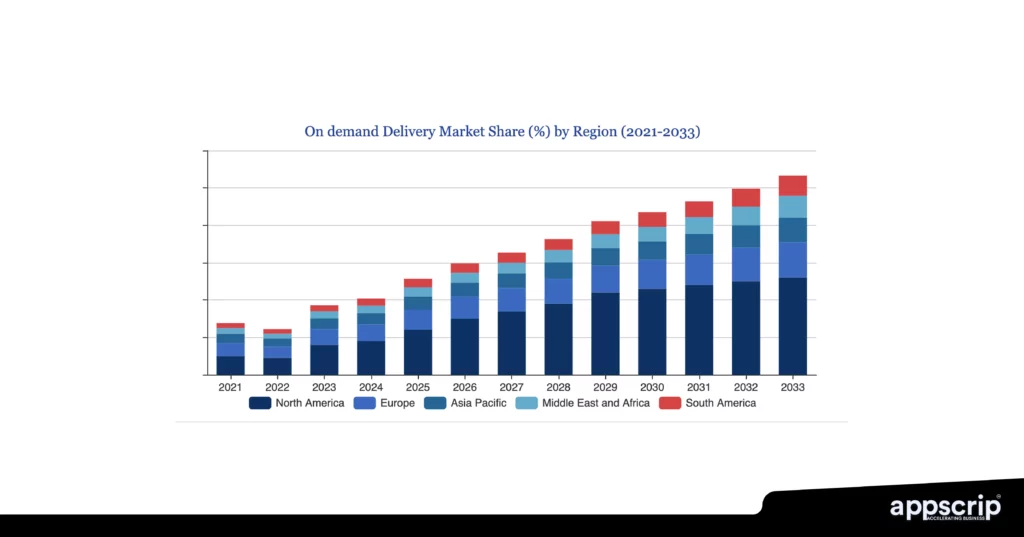The on-demand supply financial system reinvented how items and companies attain customers. With platforms like DoorDash, Instacart, and Amazon Contemporary acing their domains, this area of interest has set their money registers jingling.
From meals and groceries to prescriptions and packages, prompt supply has grow to be a fundamental necessity for urbanities. This pattern piggy-backs on know-how, logistics, and client comfort.
Our weblog dissects tactical methods and opinions leaders of the on-demand house. In case you’re a startup founder, product head, or enterprise chief exploring this sector, you’ll uncover key enterprise fashions, top-performing apps by class, and actionable insights to assist determine the very best alternatives and approaches on your personal enterprise.
What’s On-Demand Supply?
Definition and Market Overview
On-demand supply is the near-instant or real-time supply of products or companies made attainable by cellular apps or digital platforms. Customers place orders and obtain stuff—be it a meal, grocery basket, or prescription—throughout the hour.
These apps usually depend on gig-economy employees or third-party logistics (3PLs) to ship orders shortly. Widespread classes embody:
- Meals supply (e.g., Uber Eats, DoorDash)
- Grocery supply (e.g., Instacart, Amazon Contemporary)
- Bundle & courier supply (e.g., Roadie, GoShare)
- Alcohol supply (e.g., Drizly, Saucey)
- Pharmacy & healthcare supply (e.g., Capsule, Amazon Pharmacy)
In 2023 the worldwide on-demand supply market dimension was $15.19 billion. It’s predicted to develop to $83.82 billion by 2032 at a CAGR 20.90%.
Why the Mannequin is Booming
A number of key drivers are causes for rise of on-demand supply within the US:
- Shopper Demand for Comfort: Prospects count on pace, flexibility, and real-time monitoring.
- Urbanization & Digitization: Dense metropolis residing, mobile-first conduct, and widespread smartphone adoption have accelerated development.
- Pandemic-Pushed Conduct: COVID-19 drastically shifted client habits, normalizing app-based ordering for necessities and luxuries alike.
For entrepreneurs and startups, these circumstances introduced upon a really perfect scenario to construct, innovate, and scale within the comfort financial system.

On demand supply market share by area
Enterprise Fashions of On-Demand Supply Apps
The success of on-demand supply apps hinges not solely in its pace or person expertise—but in addition the enterprise mannequin they tackle. Whether or not you’re launching a brand new platform or integrating supply into your current enterprise, understanding varied fashions is vital for scalability, monetization, and buyer retention.
Platform to Shopper (P2C)
The Platform to Shopper mannequin is mainly an aggregator mannequin whereby a third-party platform connects end-users with a number of distributors (eating places, shops, pharmacies, and so forth.). These platforms are intermediaries which might be chargeable for supply logistics and buyer relationship, whereas distributors give attention to order fulfilment.
Examples:
- DoorDash – Provides a broad community of eating places and retailers.
- Uber Eats – Leverages Uber’s logistics infrastructure for meals supply.
- Grubhub – One of many earliest gamers with robust native partnerships.
Income Mannequin:
- Fee Charges (15%–30%) from distributors on every order.
- Supply Charges charged to clients.
- Promotional Charges or boosted listings paid by distributors to achieve visibility.
- Subscription Companies like DashPass (DoorDash) for charge waivers.
Benefits for Entrepreneurs:
- Fast scalability through third-party retailers.
- Entry to a multi-vendor ecosystem with out stock administration.
- Recurring income via a number of streams.
Challenges:
- Skinny revenue margins resulting from excessive operational prices.
- Dependency on driver networks and vendor efficiency.
- Tough to construct long-term model loyalty.
Enterprise to Shopper (B2C)
On this mannequin, companies function their very own branded app and handle the end-to-end supply course of—together with order acceptance, logistics, and buyer expertise. This offers them full management over the transaction lifecycle.
Examples:
- Domino’s – Constructed its proprietary tech stack and owns supply operations.
- Papa John’s – Provides promotions and monitoring via its native app.
Advantages:
- Full Model Management: UX, messaging, pricing, and supply are absolutely owned.
- Buyer Loyalty: Direct engagement results in increased retention and repeat purchases.
- Knowledge Possession: Companies acquire entry to crucial insights like shopping for conduct and supply traits.
Excellent For:
Established manufacturers with recurring demand and logistic functionality to deal with in-house supply
Challenges:
- Excessive upfront funding in tech, logistics, and personnel.
- Calls for tight operational coordination for on-time deliveries.
- Consumer acquisition sluggish in comparison with aggregators.
Enterprise to Particular person (E2P)
That is extra like an enterprise-focused variant of B2C. On this mannequin giant organizations ship merchandise on to customers via devoted channels. Typically organisations even mix cellular apps, kiosks, and in-store pickups. The emphasis is also on brand-owned experiences personalised for high-volume, customized transactions.
Examples:
- McDelivery (McDonald’s) – Built-in with third-party and personal apps in varied areas.
- Starbucks – Provides app-based ordering, loyalty rewards, and in-store pickup/supply.
Focus Areas:
- Personalised Expertise: Combines digital ordering even in bodily areas.
- Recurring Prospects: Sturdy loyalty and model recall, particularly for daily-use classes like espresso or quick meals.
- Built-in Omnichannel Technique: Helps online-to-offline (O2O) buyer journeys.
Why It Issues:
E2P go well with enterprises which have a big geographical unfold and a powerful model picture. These companies can unify their digital and offline efforts to create seamless buyer interactions and nonetheless leverage third-party supply companions as per want.
| Mannequin | Key Function | Greatest For | Income Supply |
| Platform to Shopper (P2C) | Aggregator with a number of distributors | Startups and marketplaces | Commissions, supply & promo charges |
| Enterprise to Shopper (B2C) | Model-owned app with in-house supply | Established manufacturers with logistics | Direct gross sales, loyalty packages |
| Enterprise to Particular person (E2P) | Enterprise-grade direct-to-consumer | Giant enterprises (QSRs, chains) | Gross sales, subscriptions, omnichannel upsell |
High On-Demand Supply Apps within the US (By Sector)
The on-demand supply market within the US is cut up throughout a number of sectors—every dominated by skilled gamers. Understanding their dynamics and their worth propositions is important for companies planning to enter or compete on this house.
Meals Supply Apps
Uber Eats
A powerful contender in most metro areas, Uber Eats provides vast restaurant protection, real-time monitoring, and seamless integration with Uber’s broader ecosystem.
Excellent for: Urbanities in search of comfort and multi-service app customers.
DoorDash
The market chief, with over 60%+ share in cities like SFO and Houston, DoorDash excels with logistics effectivity, robust restaurant partnerships, and a high-performing white-label service (Drive).
Excellent for: Entrepreneurs aiming to review scalable supply operations.
Grubhub
The unique participant on this area of interest, Grubhub focuses on hyperlocal restaurant partnerships, even going to the extent of providing decrease supply charges in dense areas.
Excellent for: Native-first methods and area of interest markets.

International on-demand supply market dimension
Grocery Supply Apps
Instacart
Instacart is the prevalent supply juggernaut with over 900 retailers that embody Costco, Kroger, and Walmart. Consumers handpick orders in-store, guaranteeing same-day service.
Excellent for: Accomplice-focused grocery fulfilment fashions.
Amazon Contemporary
This quick grocery supply system is built-in with Amazon Prime. They rely on Amazon’s warehousing and logistics to ship inside 2 hours in choose areas.
Excellent for: Companies exploring warehouse-to-door fashions.
Shipt
Owned by Goal, Shipt delivers from a large community of shops and is thought for its well-packaged customer support and same-day ensures.
Excellent for: Retailers aiming for speedy supply from bodily areas.
Bundle & Courier Supply Apps
Postmates (now a part of Uber)
Has the reputation of delivering almost something—from takeout to workplace provides. Utilises Uber’s infrastructure for last-mile protection.
Excellent for: All-purpose supply startups and hybrid platforms.
Roadie
Swivels on a crowd-sourced driver community for same-day and outsized deliveries. Finds acceptance with retailers in search of versatile logistics.
Excellent for: Companies with heavy, cumbersome or irregular merchandise wants.
GoShare
They focus on native transferring, furnishings supply, and B2B logistics, linking customers with pickup truck drivers and movers.
Excellent for: Heavy merchandise transport and on-demand transferring companies.
Alcohol Supply Apps
Drizly
Supplies companies in over 1,500 US cities, Drizly companions with native liquor shops for quick and authorized alcohol supply. Now beneath Uber’s umbrella.
Excellent for: Compliance-driven, multi-vendor supply fashions.
Minibar Supply
Provides each scheduled and on-demand companies. Well-liked for occasion planning and company orders.
Excellent for: Deliberate-use circumstances and repeat alcohol deliveries.
Saucey
Taking comfort to the party-planners with 30-minute supply in cities like LA, Chicago, and NYC. Targets premium buyer experiences.
Excellent for: Luxurious, area of interest, or high-speed alcohol supply startups.
Pharmacy & Healthcare Supply Apps
Capsule
Ensures same-day prescription supply and supplies a powerful digital expertise, particularly in NYC and choose cities. Handles refills and insurance coverage coordination.
Excellent for: Digital well being startups and telehealth add-ons.
Amazon Pharmacy
Presents a profitable mixture of Prime transport with clear drug pricing. Aggressive for widespread prescriptions and recurring refills.
Excellent for: Mass-scale, cost-focused healthcare supply.
PillPack (Amazon-owned)
Simply excellent for repeat clients and persistent care sufferers by providing pre-sorted every day treatment packs delivered on a month-to-month foundation.
Excellent for: Subscription-based well being supply fashions.

Future Traits in On-Demand Supply
AI and Automation
AI and automation entails capabilities to rework most industries and on-demand supply is not any totally different. AI / automation improves effectivity, reduces prices, and enhances buyer experiences. Key developments embody:
- Predictive Ordering – AI analyzes historic knowledge to forecast demand, serving to companies optimize stock and cut back waste.
- Clever Routing – Machine studying algorithms optimize supply routes in real-time, contemplating visitors, climate, and supply home windows.
- Buyer Conduct Insights – AI-driven analytics are helpful to customize suggestions, promotions, and supply preferences.
- Autonomous Deliveries – Drones, robots, and self-driving autos are on the way in which for last-mile supply within the close to future.
Sustainable Supply Fashions
With rising environmental issues, firms are adopting greener supply options:
- Eco-Pleasant Fleets – Electrical autos (EVs), e-bikes, and cargo bikes cut back emissions in city areas.
- Carbon-Impartial Supply Choices – Firms offset emissions via renewable power investments or carbon credit.
- Micro-Fulfilment Facilities – Decentralized warehouses cuts supply distances and gasoline utilization.
- Reusable Packaging – Companies are additionally recognized to gather containers which might be used to reduce waste.
Vertical Specialization
Specialisation is creeping into each area and a one-size-fits-all supply platforms just isn’t acceptable any extra, area of interest markets are rising:
- Healthcare & Prescription drugs – On-demand supply of medicines, lab samples, and medical provides.
- Luxurious & Excessive-Worth Items – Safe, white-glove supply for premium merchandise (e.g., jewellery, wonderful wine).
- B2B Logistics – Specialised apps for restaurant provides, workplace gear, and industrial components.
- Grocery & Meal Kits – Devoted apps with temperature-controlled logistics for perishables.
Conclusion: On-Demand Supply Apps
The on-demand supply house within the US is projected to succeed in $83.82 billion by 2032, pushed by pace, comfort, and AI-powered personalization. Whereas giants like Uber and Amazon lead a number of verticals, there’s nonetheless room for innovation—particularly in underserved or area of interest markets.
For entrepreneurs and companies, choosing the proper mannequin and tech basis is vital. With evolving buyer expectations and sustainable practices changing into a norm, that is the best time to construct or spend money on the subsequent technology of on-demand supply options.

